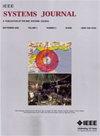Consensus Control for Discrete-Time Stochastic Multiagent Systems Under a Multiple Description Coding Mechanism
IF 4.4
3区 计算机科学
Q1 COMPUTER SCIENCE, INFORMATION SYSTEMS
引用次数: 0
Abstract
This article addresses the consensus control problem for a specific class of discrete-time stochastic multiagent systems (MASs). When transmitting the local measurement output to the local controller and neighboring agents, a multiple description coding (MDC) scheme is introduced to reduce the communication burden and enhance data transmission reliability in a resource-constrained environment. The MDC scheme encodes each signal into two descriptions, which are then transmitted through separate channels, and decoding schemes are employed to address the different characteristics of the arrival of the two descriptions, ensuring the boundedness of the decoding error. The proposed consensus control scheme uses the relative decoded measurement errors between local agents and their neighbors. The aim is to design an output-feedback control scheme that ensures the error dynamics of the controlled MAS reach exponentially mean-square boundedness. Sufficient conditions are established for the existence of the controllers through stochastic analysis techniques, and the desired controller gains are parameterized using the feasibility of certain matrix inequalities. The effectiveness of the proposed coding-decoding-based consensus control scheme is verified through a numerical simulation.多描述编码机制下离散时间随机多智能体系统的一致性控制
本文研究一类特定的离散时间随机多智能体系统(MASs)的一致性控制问题。在将本地测量输出传输到本地控制器和相邻代理时,引入了多描述编码(multi - description coding, MDC)方案,以减少通信负担,提高资源受限环境下数据传输的可靠性。MDC方案将每个信号编码为两个描述,然后通过单独的信道传输,并采用解码方案来解决两个描述到达的不同特征,确保解码错误的有界性。所提出的共识控制方案利用了局部智能体与其相邻智能体之间的相对解码测量误差。目的是设计一种输出反馈控制方案,以确保被控MAS的误差动态达到指数均方有界。利用随机分析技术建立了控制器存在的充分条件,并利用若干矩阵不等式的可行性参数化了控制器的期望增益。通过数值仿真验证了所提出的基于编码-解码的一致性控制方案的有效性。
本文章由计算机程序翻译,如有差异,请以英文原文为准。
求助全文
约1分钟内获得全文
求助全文
来源期刊

IEEE Systems Journal
工程技术-电信学
CiteScore
9.80
自引率
6.80%
发文量
572
审稿时长
4.9 months
期刊介绍:
This publication provides a systems-level, focused forum for application-oriented manuscripts that address complex systems and system-of-systems of national and global significance. It intends to encourage and facilitate cooperation and interaction among IEEE Societies with systems-level and systems engineering interest, and to attract non-IEEE contributors and readers from around the globe. Our IEEE Systems Council job is to address issues in new ways that are not solvable in the domains of the existing IEEE or other societies or global organizations. These problems do not fit within traditional hierarchical boundaries. For example, disaster response such as that triggered by Hurricane Katrina, tsunamis, or current volcanic eruptions is not solvable by pure engineering solutions. We need to think about changing and enlarging the paradigm to include systems issues.
 求助内容:
求助内容: 应助结果提醒方式:
应助结果提醒方式:


